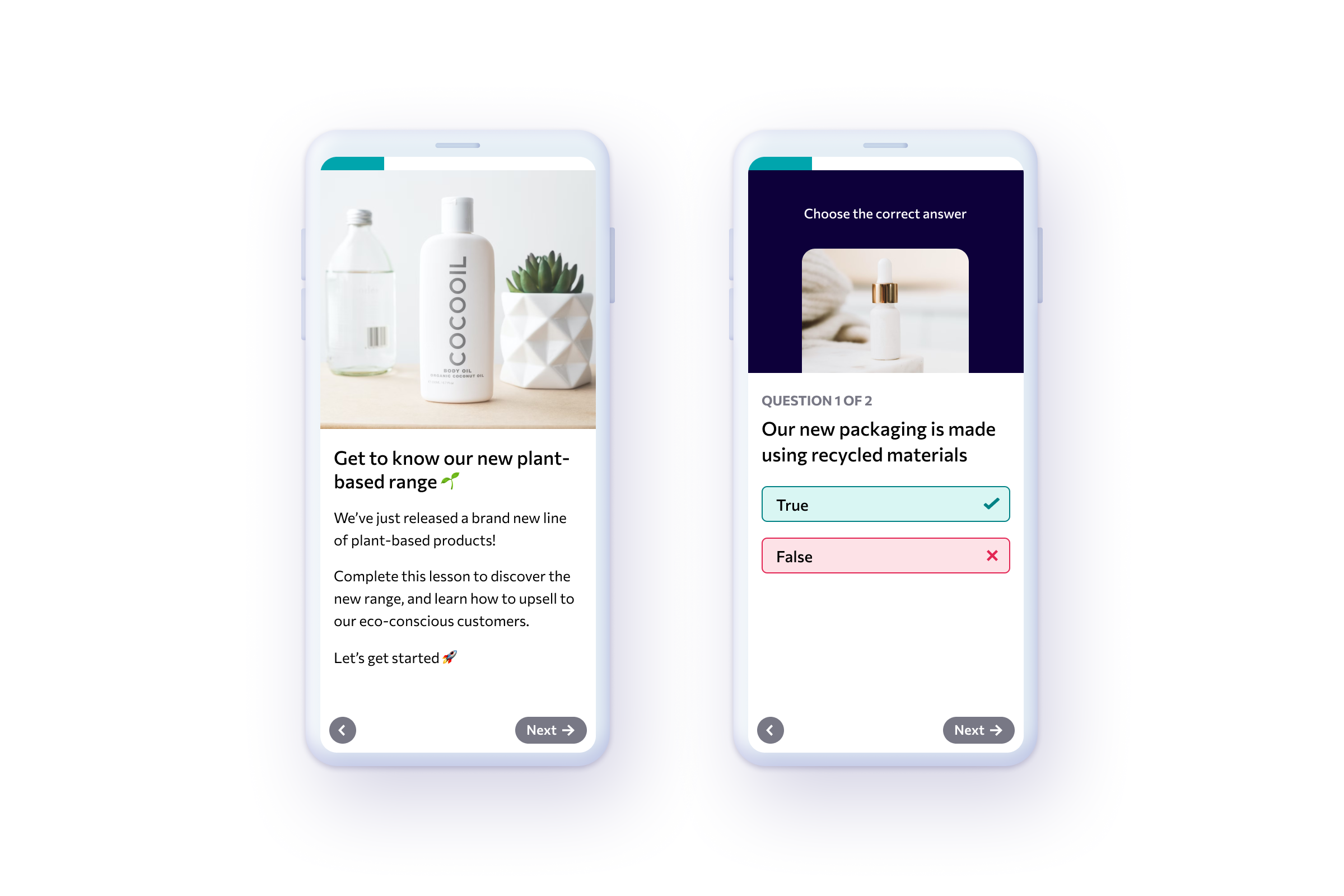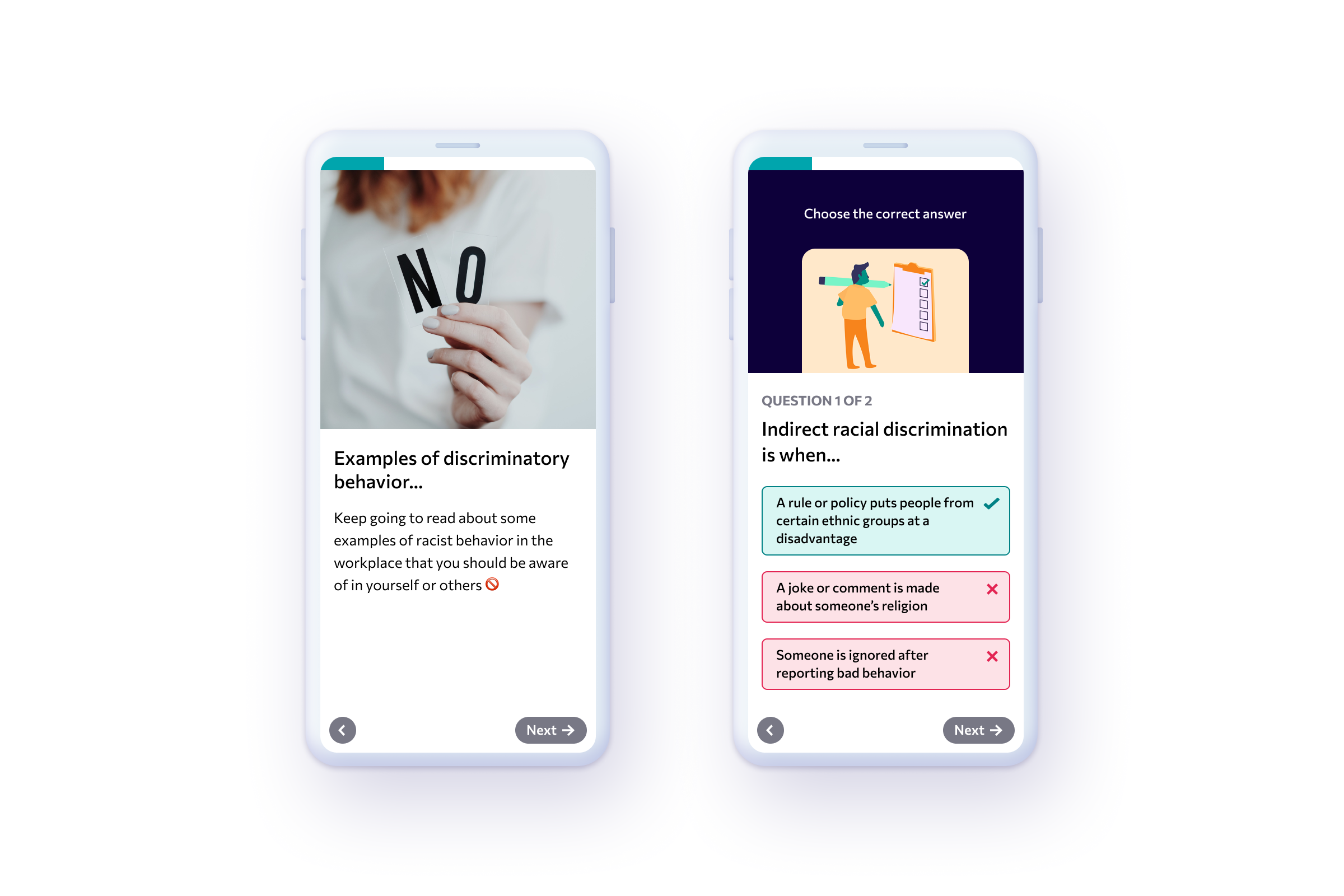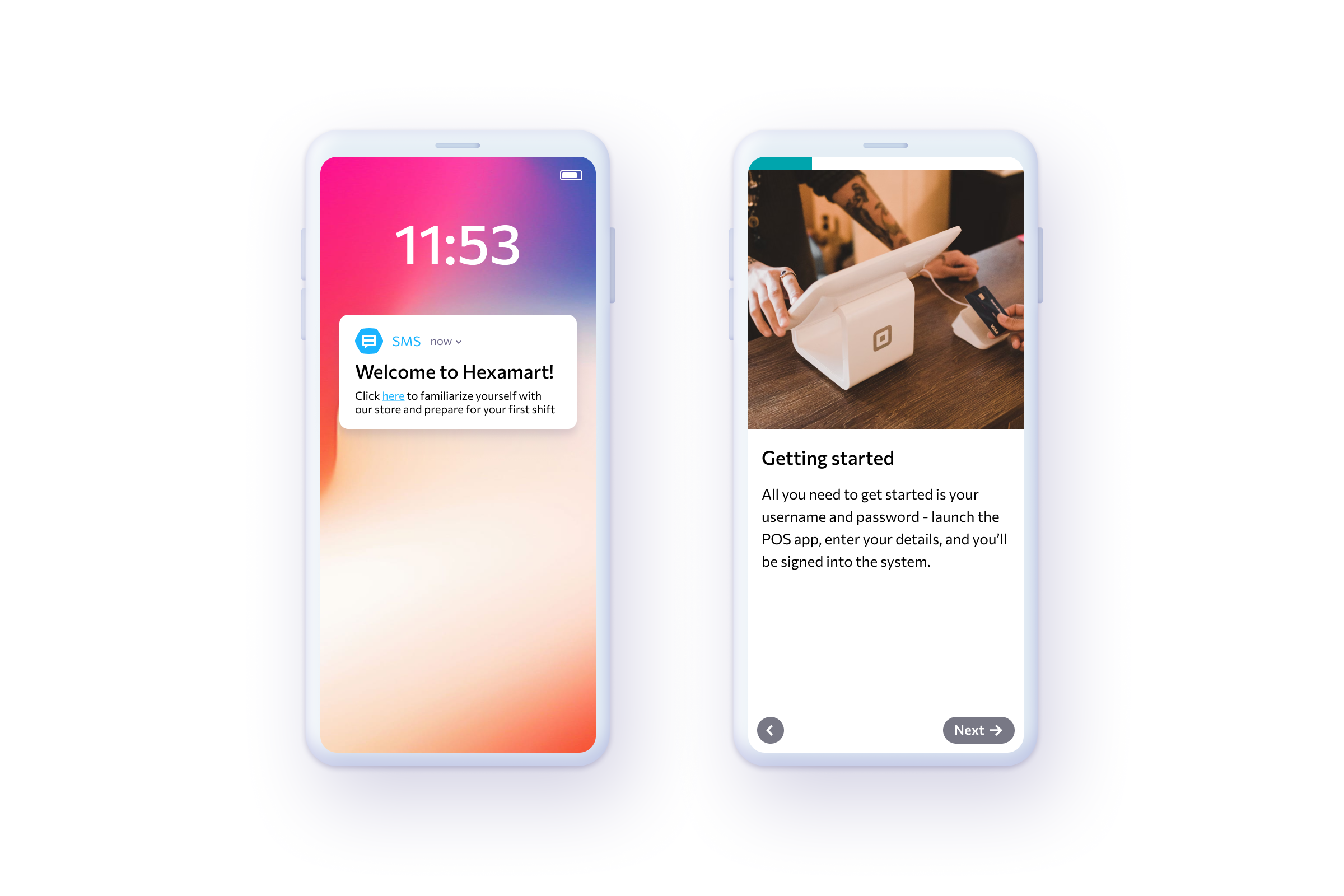Any good retailer will tell you that the customer experience is everything. Good CX has the power to differentiate you from your competition, increase revenue and even boost employee retention.
We know that five star customer experience is the number one goal, but what’s less clear is exactly how to get there.
Many retailers are turning to technology to optimize their CX offering - for example, IKEA is leveraging AR to create interactive experiences for their online customers - and focusing on key consumer asks such as greater personalization and smooth omnichannel operations.
What’s often overlooked, however, is the most basic element of effective customer experience: employee training. By providing your workforce with the skills they need to confidently serve and interact with customers day in, day out, you can ensure a consistently high quality experience for your customers.
But don’t just take our word for it. Here are the main obstacles to outstanding customer experience, and five case studies from leading frontline businesses which prove that effective training is the solution.
Quick navigation:
- Key challenges in customer experience
- Uber - immersive conflict resolution training
- Tigo - bitesize product knowledge
- Pet Supermarket - social media-style customer service training
- Uber - in-app cultural awareness education
- PedidosYa - automated onboarding for new users
-1.png?width=1920&height=1080&name=Grocery%20(3)-1.png)
Key challenges in customer experience
1. Conflict
US employees spend around 2.8 hours each week dealing with conflict, meaning that a full day of productivity is lost to conflict every month. While resolving conflict comes as part of the job, many workers aren’t given the tools they need to manage these difficult situations and are left vulnerable. In fact, 60% of employees say they never received any basic conflict management training in their workplace.
When your workforce doesn’t have the necessary skills to handle tricky situations and resolve problems, it’s not just the customer that loses out. Employees that are consistently left feeling isolated and unsupported at work are at a higher risk of churn, which can impact your customer experience even further.
2. Poor product knowledge
Product knowledge and expertise is becoming a top priority for the evermore demanding customer. In fact, nearly half of shoppers will abandon a brand if employees are not knowledgeable about the product or service they’re offering.
So what’s the barrier? More often than not, it’s simply that this knowledge isn’t accessible - 28% of retail associates say they can’t find information quickly enough to help shoppers. Another obstacle is the difficulty brands experience in keeping their workforce up to date with changing product features and specifications, leading to inconsistencies across branches and preventing sales associates from being able to meet their customers’ needs.
3. Lack of customer service skills
Customer service skills are the basis of good CX. 93% of employees who receive regular on-the-job training say they deliver a better experience and overall customer care, yet almost 50% of sales associates are trained only once a year or less.
The benefits of training are well known, but in a fast-paced environment such as retail, it can quickly slip down the list of priorities. Especially amid recent talent shortages, the influx of inexperienced new hires met with a lack of time and resources to properly train them has massively impacted the customer experience. A workforce that lacks key customer service skills can’t hope to meet the high standards expected from today’s consumers, nor prevent them from switching to a competitor.
4. No cultural awareness
Recent years have seen important conversations around discrimination brought to the fore, with many businesses committing to improving diversity and inclusion within their workplace. Unfortunately, these commitments don’t always extend to the frontline, despite this being the first point of contact customers will have with a brand.
Retailers cannot sit back and hope that their workforce doesn’t unintentionally offend their customers. They must take action to ensure that workers are educated on cultural differences, and are confident in making sure that everyone on the shop floor feels welcome. Not just because it’s the right thing to do, but also because customer loyalty depends on it - in the last year, 41% of shoppers have shifted their business away from a retailer that does not reflect how important diversity and inclusion is to them.
5. Low adoption of new technologies
As technology continues to evolve, both in our personal lives and in the workplace, the frontline still gets left behind. 34% of workers in the industry say they aren't equipped or adapting to digital tools, and nearly half actually list outdated technology and a lack of training as their biggest frustration with the industry, with many leaving as a result of stores being “too rigid”.
It’s not enough to simply tick a box. Employers need to introduce technology that actually aids their workers and train them on how to use it properly. Not doing so risks causing even more disruption on the frontline as workers spend their time grappling with new tools instead of focusing on what matters: the customer.
.png?width=1920&height=1080&name=Fashion%20(8).png)
How brands are using training to improve their CX
Training a workforce that’s widely dispersed and constantly on-the-go is no mean feat. In order for upskilling initiatives to have real impact, you need to ensure that lessons are bitesize, easily accessible and highly engaging.
That’s why leading brands rely on eduMe, the training tool that’s purpose-built for the frontline.
Read on to find out how these five companies used eduMe to improve their own customer experience, and the results that they’ve seen from their investment.
1. Uber - immersive conflict resolution training
Uber’s global network of driver partners completes an average of 14 million trips per day. With so many customer interactions taking place every second, the rideshare giant needed a way to prepare their driver partners on how to manage difficult situations with passengers and ensure customer satisfaction.
Using eduMe’s Scenario Videos feature, Uber were able to enhance their de-escalation training with immersive learning experiences. These interactive quizzes presented real-world scenarios driver partners were likely to encounter in their day-to-day work - such as identifying situations that are high risk, or responding to an emergency - and empowered them to think critically about the impact of their choices.
Leveraging this highly engaging feature meant that Uber were able to demonstrate safe and appropriate conflict de-escalation that really resonated with their workforce - 97% of learners found the content useful, and they saw 31% higher than average completion rates.
Working with eduMe on training initiatives such as this has helped Uber to better equip their drivers in providing excellent customer service, leading to a 10% increase in driver partner ratings.
2. Tigo - bitesize product knowledge
Leading cable services provider Tigo has a large network of on-the-ground sales agents who are responsible not only for selling a wide range of products, but also providing a 5-star customer service. With such a widely scattered, deskless workforce, communication was a challenge. In-person workshops and printed sales materials weren’t enough to keep their agents up-to-date, leading to inconsistencies in service and low performance.
Introducing a microlearning strategy with eduMe has enabled Tigo to deliver key product information in the form of engaging, bitesize lessons. Designed to maximize knowledge retention, sales agents can use these lessons to upgrade their skills and learn about new product features on-the-go, via their personal devices.
As a result of empowering their sales agents with easy access to product knowledge, Tigo saw a 66% increase in sales in just three months. The transition to microlearning modules also meant that agents spent three hours less on training, freeing up their time to serve more customers.
3. Pet Supermarket - social media-style customer service training
Pet Supermarket is a US-based retail chain with over 220 branches, and a strong focus on customer experience. However, the in-person training methods they previously relied on were failing to excite their Gen-Z learners and impossible to standardize, compromising their workforce’s ability to deliver a one-of-a-kind experience.
With eduMe Guides, Pet Supermarket can deliver engaging and impactful content in a highly consumable, social media-style format. Accessible via in-store QR codes, Guides are perfectly placed to inspire and inform their time-poor workers, empowering them to provide a consistently efficient and personalized service.
Since rolling out eduMe Guides, Pet Supermarket have seen a 79% average completion rate - 49% higher than the industry average - as well as highly positive feedback from their employees, 89% of whom stated that they enjoyed being upskilled in this way.
Better yet, the transition to digestible, bitesize video content has reduced the time required for training to just 2 minutes, meaning minimal disruption to employee productivity and more time spent with customers.
Quick and simple to create, Guides can be made by anyone. Pet Supermarket use this to their advantage by empowering local champions to share their expertise and encouraging social learning from the ground up.
Confidence comes from being knowledgeable about what they’re talking about, their love of the industry and pets. eduMe is at the center of that.
 - Theresa Micheli, Store Operations at Pet Supermarket
- Theresa Micheli, Store Operations at Pet Supermarket
4. Uber - in-app cultural awareness education
With such a diverse customer base interacting with their platform and driver partners every day, Uber is tasked with ensuring that those representing them on the frontline have the awareness and empathy they need to serve a wide variety of customers.
Uber has partnered with eduMe on a number of important initiatives aimed at improving cultural awareness. Using our seamless technology, the rideshare company delivered in-app anti-racism education to 23 million customers, drivers and delivery partners across Brazil. Providing one-tap access to education within their own app allowed them to maximize the reach of their initiative, working to lower incident rates and champion equity.
Through eduMe, Uber also launched a highly successful campaign focused around fostering tolerance and understanding of the LGBTQ+ community. Interactive lessons were delivered seamlessly to 200,000 drivers and delivery partners across Mexico, of whom 58% reported that they had changed their behavior as a result of the training content.
The ability to deliver education of this nature on such a scale - and in such a frictionless manner - has been essential for Uber in helping them to achieve their goal of ensuring that everyone can move freely and safely. With greater awareness of various cultures and experiences, their driver partners are better equipped to provide every passenger with an exceptional service.
The eduMe platform really helped us in integrating these through our own app…the access to that optional education is completely seamless, so there’s no need to log in.
 - Cecilia Román, Safety Communications at Uber Mexico
- Cecilia Román, Safety Communications at Uber Mexico
5. PedidosYa - automated onboarding for new users
As the leading Latin American delivery platform, PedidosYa connects thousands of restaurants and businesses with millions of users. Prior to using eduMe, they onboarded new vendors to their platform through 60-minute webinars, making it difficult to ensure consistency in quality and failing to keep businesses engaged with their platform before they’d even begun fulfilling orders.
Thanks to eduMe’s integration with cross-channel customer engagement platform Braze, PedidosYa were able to create an automated onboarding plan for new vendors which provides seamless access to bite-sized training courses on eduMe. Users were able to complete their training in less time and feel better prepared to start earning on the PedidosYa platform, decreasing reliance on customer support and resulting in a smoother user experience.
Delivering onboarding information in this quick, engaging format led to a reduction in vendor inactivity, with the number of new vendors failing to complete an order within the first month decreasing by 15%. In fact, new vendors who completed onboarding via eduMe showed an increase in activity on their platform, and rejected fewer orders.
PedidosYa also received 99% positive feedback from their users who described eduMe as ‘clear’, ‘intuitive’, ‘easy’ and ‘dynamic’. Vendors also began asking more specifically about their product offering, showing that they had become more invested in the platform as a whole. Effective training didn’t just improve customer retention, but also affinity with their brand.
Improve your customer experience with eduMe
With one-tap access to product specifications, sales techniques and de-escalation support - within the tools you’ve already invested in - you can give your employees the tools they need to provide exceptional customer experiences, every single time.
Want to get started with eduMe? Try out one of our customer service course templates below 👇














